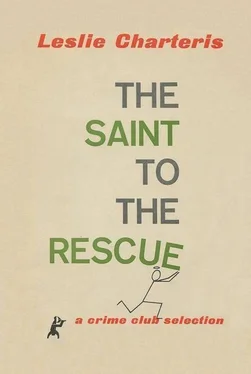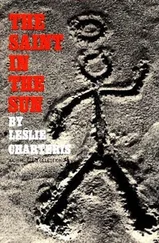Leslie Charteris - The Saint to the Rescue
Здесь есть возможность читать онлайн «Leslie Charteris - The Saint to the Rescue» весь текст электронной книги совершенно бесплатно (целиком полную версию без сокращений). В некоторых случаях можно слушать аудио, скачать через торрент в формате fb2 и присутствует краткое содержание. Город: Garden City, NY, Год выпуска: 1959, ISBN: 1959, Издательство: The Crime Club, Doubleday & Company, Жанр: Крутой детектив, на английском языке. Описание произведения, (предисловие) а так же отзывы посетителей доступны на портале библиотеки ЛибКат.
- Название:The Saint to the Rescue
- Автор:
- Издательство:The Crime Club, Doubleday & Company
- Жанр:
- Год:1959
- Город:Garden City, NY
- ISBN:978-147784293-5
- Рейтинг книги:5 / 5. Голосов: 1
-
Избранное:Добавить в избранное
- Отзывы:
-
Ваша оценка:
- 100
- 1
- 2
- 3
- 4
- 5
The Saint to the Rescue: краткое содержание, описание и аннотация
Предлагаем к чтению аннотацию, описание, краткое содержание или предисловие (зависит от того, что написал сам автор книги «The Saint to the Rescue»). Если вы не нашли необходимую информацию о книге — напишите в комментариях, мы постараемся отыскать её.
The Saint to the Rescue — читать онлайн бесплатно полную книгу (весь текст) целиком
Ниже представлен текст книги, разбитый по страницам. Система сохранения места последней прочитанной страницы, позволяет с удобством читать онлайн бесплатно книгу «The Saint to the Rescue», без необходимости каждый раз заново искать на чём Вы остановились. Поставьте закладку, и сможете в любой момент перейти на страницу, на которой закончили чтение.
Интервал:
Закладка:
“I don’t know. But Sholto got off. He had some sort of alibi, and they couldn’t find anyone who’d seen him leaving the shop. I was the only one who could have identified him — and I’d lost my sight. Of course, I’d heard his voice, too, but that’s much harder. His attorney made a complete fool of me in court when it came to picking out his voice from a lot of others.”
Simon nodded.
“That seems to ring a bell. He had private detectives with tape recorders all over the country, scouting for people with voices like Sholto’s. He even hired professional mimics. It was one of the tricks that made him famous.”
“It worked, anyhow,” Mrs Yarrow said with a kind of weary resignation. “It was months afterwards, and you don’t remember a voice the same as you do a face, at least not when you’re more used to relying on your eyes.”
“But you’re absolutely sure, in your own mind, that it was Sholto?”
“I was absolutely certain, the first time the police let me hear him talk. It was only afterwards that the lawyers confused me. And it must have been him, mustn’t it? Look at everything he’s done since.”
The Saint could not bring himself to point out that this argument was the direct antithesis of some of the fundamental tenets of civilized legal doctrine, for it was an attitude which he had often taken himself.
Instead, he said, “Isn’t there any chance of doing anything for your eyes?”
“Nothing. They told me before I left the hospital that I’d never see again.”
“But that was a long time ago,” he persisted. “Haven’t you tried again since?”
She shook her head.
“I don’t see any use trying to keep giving myself false hopes. They were much too definite. And I’ve learned to live with it. But I still can’t stop wishing Sholto would get what he deserves.”
Simon paid for the paper and went back to the car which he seemed to have left in another chapter of his existence, so much had changed since he walked into the little sundries store.
It was not really such a wild coincidence that he had thus met Mrs Yarrow and heard her story, for at the time he had not been personally preoccupied with either Rood or Sholto. Although he could visualize them as theoretically intriguing subjects for future attention, his interest at the moment had been only the lively but abstract interest of any wide-awake citizen, which would also have encompassed the latest Hollywood marriage or the latest South American revolution. It would have been no more important a coincidence, mathematically, if the news vendor had turned out to have once manicured the film star or nursed the deposed President or had any distant connection with anyone else in the news. The difference was that in any other such situation the Saint would have murmured some polite clichés and quickly forgotten the whole thing. Agnes Yarrow fell into another category only because this was the kind of encounter which so often brought the Saint’s catholic but diffused concern for the Ungodly into sharp focus on one or two particular specimens.
Mr Carlton Rood, as a result of such an accidental conversation, was suddenly promoted into this inauspicious spotlight.
Simon Templar traveled no farther that day than one of the motels facing the Gulf west of town, where he read the complete newspaper story and then spent two or three hours in intense meditation. The stratagems by which Mr Rood had won another acquittal for his client need not be retold here in laborious detail: it is sufficient for this story, as it was for the Saint’s motivation, that they were typically ingenious, immoral, and successful. Nothing else was needed to qualify Mr. Rood for immediate retribution, in the Saint’s judgment, but the manner of providing for it required inventiveness and planning.
After dinner that night he made a long-distance phone call, and the next morning he drove back to Biloxi and Mrs Yarrow’s little shop.
“I took what you may think was rather a liberty last night,” he told her. “I talked about your case to a friend of mine in Santa Barbara, California, who’s one of the best ophthalmologists in the country. I must tell you bluntly that he wasn’t very optimistic. But he would like to see you.”
“It’s very kind of you,” she said. “But I just can’t afford a trip like that.”
“I’d like to pay for it — please don’t be offended. If that sounds too much like charity, I promise that if he is able to restore your sight I’ll let you pay me back every penny. I know you’d think that was worth the money. But if he can’t do anything for you it won’t cost you a cent. Let me take the gamble, and I give you my word it won’t hurt my bank account a bit if I lose.”
“But I told you I didn’t want to torment myself with false hopes.”
“You want something done about Sholto, don’t you? If you had your sight back, you could identify him again — and he could still be tried for the murder of your husband. That would mean something to you, wouldn’t it?”
As she wavered, he took her hand and put an envelope into it.
“This is a plane ticket I bought this morning, in your name, from New Orleans to Santa Barbara,” he said. “The reservation is for Sunday — that gives you three days to make your personal arrangements, and it should be a good day for you to get someone to drive you to the airport. You have to change planes in Los Angeles, but the airline will look after you there. And I’ll have my doctor friend send someone to meet you at Santa Barbara airport. His name and address are written on the envelope, if you want to tell your friends where you’re going.”
“But what about your name?” she protested weakly. “And why do you want to do this for me? I don’t know anything about you except that you’ve got a nice voice!”
“That’s all I intend you to know right now,” said the Saint. “But if you must think of me by some label, you may call me Santa Claus.”
He drove to New Orleans himself the same morning and took the next plane to New York, where Mr Rood had long since transferred his headquarters from his more pastoral beginnings in the South.
One of the Saint’s intangible assets, and one of incalculable value in his peculiar activities, was the vast and variegated collection of acquaintances that he had accumulated and cultivated over the years, a roster of trades and professions that was a unique classified directory in itself.
Besides a friend who was a distinguished ophthalmologist he could have produced with equal facility an ophicleidist, an oil rigger, or, probably, an orangutan. Another man whose talents he needed lived in New York when not working elsewhere, and Simon was fortunate to find him at liberty.
In the course of the following week, Mr Rood received certain visitors at his office whose roles in his destiny he did not perceive.
The first was a new client who sought his advice about making a will which would distribute his fortune fairly among his wife and daughters, protect them from fortune-hunters, ensure a substantial inheritance for his still unborn grandchildren, and yet not leave his heirs under a state of absolute tutelage. Mr Rood discoursed for some time on the theoretical problems involved, until he learned that about ninety-nine per cent of the million-dollar estate which the man was so worried about was contingent on his successful marketing of the idea of making automobiles impervious to minor collisions by building the bodies entirely out of soft rubber. Whereupon Mr Rood briskly recommended him to consult first with a patent attorney, and never thought about him again.
The second caller presented himself as a free-lance journalist who specialized in writing autobiographies, speeches, or any other kind of material for celebrities who were, if not otherwise unqualified, too busy for the dull toil of capturing their scintillating thoughts in page after page of readable prose. If he could not name any names whom he had served in this capacity, he could claim this reticence as proof of his inviolable discretion: part of his service was to avert even the slight stigma of the “as told to” type of by-line, and those who wanted to claim his articles as their own original work could do so without fear that any other person would ever hear who really wrote them. Reassuringly, he was asking nothing more than permission to approach certain editors with the idea of a series of the great lawyer’s reminiscences of his famous cases, if the work was commissioned, Mr Rood would simply supply him with court records and spend a few hours talking them over, and of course the finished stories would be completely subject to Mr Rood’s editing and approval. It was an unexceptionably straightforward-sounding proposition, and Mr Rood was quite interested in discussing it. The Saint could be disarmingly flattering and persuasive when he tried, even when wearing a rumpled suit and a studious-looking pair of horn-rimmed glasses and using the undistinguished name of Tom Simons.
Читать дальшеИнтервал:
Закладка:
Похожие книги на «The Saint to the Rescue»
Представляем Вашему вниманию похожие книги на «The Saint to the Rescue» списком для выбора. Мы отобрали схожую по названию и смыслу литературу в надежде предоставить читателям больше вариантов отыскать новые, интересные, ещё непрочитанные произведения.
Обсуждение, отзывы о книге «The Saint to the Rescue» и просто собственные мнения читателей. Оставьте ваши комментарии, напишите, что Вы думаете о произведении, его смысле или главных героях. Укажите что конкретно понравилось, а что нет, и почему Вы так считаете.












